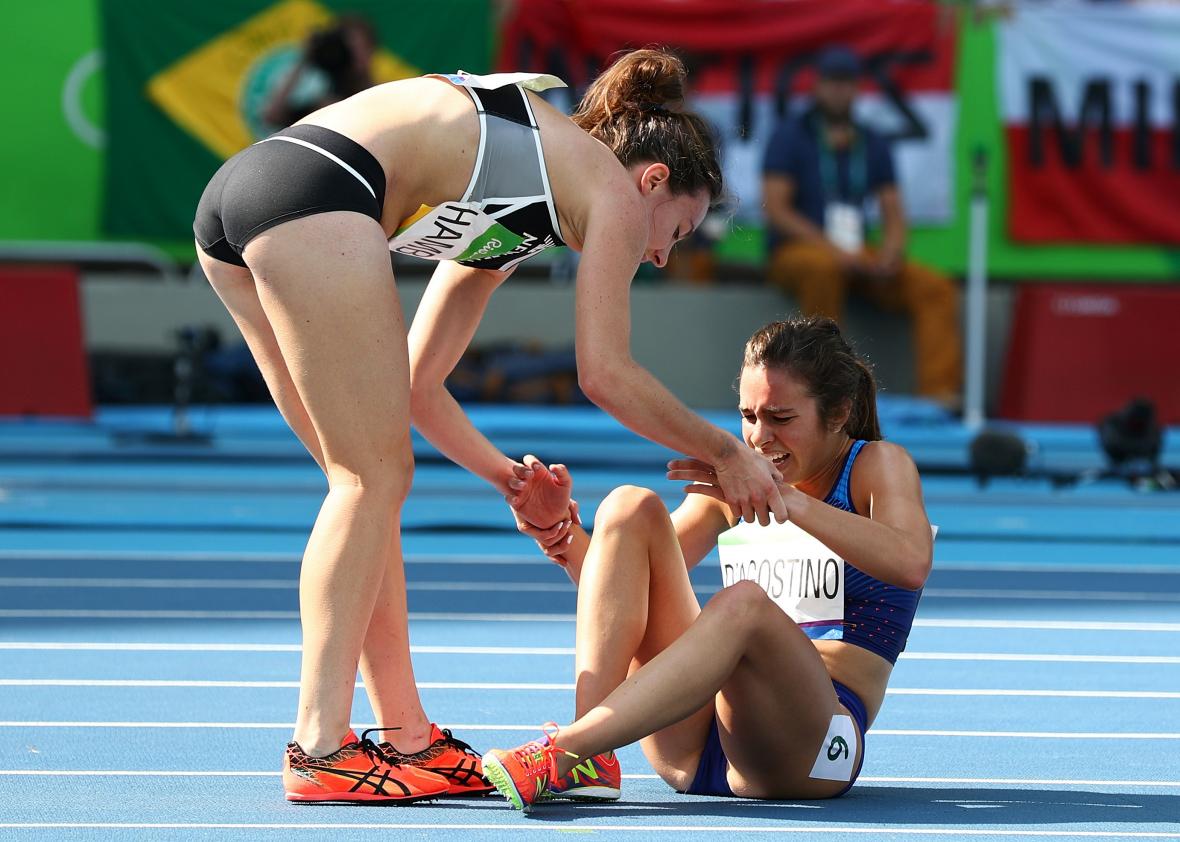I’m Starting to Hate That Moment When Olympic Runners Helped Each Other to the Finish Line

Ian Walton/Getty Images
On Tuesday, midway through a 5,000-meter heat at the Olympic Games in Rio de Janeiro, New Zealand runner Nikki Hamblin stumbled and fell. On her way down, she tripped up American runner Abbey D’Agostino, and soon both women were lying on the track. Though the accident had ruined any chance either woman had of winning the heat, D’Agostino rose and urged Hamblin to follow her lead. “Get up! Get up! We have to finish!” said D’Agostino, and the two resumed the race. When D’Agostino slowed due to a knee injury incurred in the accident. Hamblin urged her multiple times to keep going. They both finished the race—D’Agostino in last place, two minutes behind the winner, and Hamblin second to last.
Both athletes displayed admirable sportsmanship. Their actions reminded viewers that, in athletics, the journey is often more important than the destination. It was a nice thing.
But almost instantly, the D’Agostino-Hamblin tale got amplified into an Olympics moment. “[W]hat Abbey D'Agostino did Tuesday during the women's 5,000-meter event required something more than muscle or skill. It required one of the best characteristics available to humans: compassion,” wrote the UPI. The Washington Post noted that though “strangers at the starting line,” Hamblin and D’Agostino soon “found themselves eternally linked—by circumstance, by action, by benevolence.” In an article accompanied by an auto-playing video that piped in tinkling piano music, USA Today called the incident “an extraordinary gesture to warm the hearts of a global audience and spoke to everything that is good and righteous about international sports’ grandest competition.”
This is the Olympics moment industrial complex at work. A woman helping another woman on the track becomes “everything that is good and righteous about international sports’ grandest competition.” It would have been an extraordinary gesture if front-runner Almaz Ayana had stopped, backtracked, and helped Hamblin and D’Agostino across the finish line. It would have been extraordinary if either runner would have come back to win the heat; if they had endured great danger and hardship to get to the Olympics in the first place; if, I don’t know, they had been Israeli and Palestinian, respectively, and their actions had bridged a social chasm. I’m not trying to say it wasn’t a nice moment. It was quite nice! But why do so many in the media need it to be more than that?
We all know that triumph over adversity is part of the Olympics’ brand, and part of the way NBC sells the games to us every four years. Here’s how NBC packaged the incident in prime time:
“An example of Olympic sportsmanship right there, it reminds me of Derek Redmond back in the Barcelona Olympics,” said NBC’s Tom Hammond. Redmond was a British 400-meter runner who, during a semifinal heat in the 1992 Summer Games, tore his hamstring and fell. He was nevertheless determined to finish the race, and his father came out of the stands and helped him, to the applause of everyone watching.
It was another nice moment. Since then, it has been repackaged and sold to us in television spots for Nike and Visa.
Hamblin and D’Agostino’s on-track encounter will be similarly commercialized. This very small, spontaneous, genuine gesture will be used to push the Olympics product, a multibillion-dollar behemoth that depends on all of us buying the notion that the games are about people coming together in the spirit of goodwill and fellow feeling. Hamblin and D’Agostino, it turns out, are the perfect messengers for this idea because they both genuinely seem to believe it to be true.
“Were you both surprised at the global outreach that has been as a result of this, and the mention of the Olympic spirit? I mean, it was an Olympic moment that won’t soon be forgotten,” NBC’s Carolyn Manno asked the pair on Wednesday.
D’Agostino was ready to take that question and run with it. “I just think it's really affirming,” the American runner said. “We’re so bombarded with negative media all the time, and to see a simple act of kindness be recognized, and that people resonate with it, and just see how beautiful it can be, um, that's, you know, what the Olympics is about.” Hamblin, too, had expressed those sentiments right after the race: “I’m so grateful to Abbey for helping me. That girl was the Olympic spirit right there.”
Sure, I guess. Just about anything might embody the Olympic spirit, because “the Olympic spirit” is a nebulous concept that means whatever the person invoking it wants it to mean. Why does an athlete falling down and getting up embody the Olympic spirit any more than an athlete training hard, not falling down, and winning her heat? The Olympic spirit, as sold by the games’ broadcasters and dispensed by sports writers, is a fiction. When people invoke the Olympic spirit, more often than not they’re trying to get you to sign up for a credit card.
We should be very leery of efforts to depict athletic gumption as somehow “good and righteous,” to impute morality and character to actions on the field of play, as if the decision to finish or withdraw from a race holds any broader social implications. D’Agostino, it turned out, tore her ACL. If she’d stayed on the ground, her knee shredded into ribbons, would she have been any less heroic?
There are a lot of inspirational things that happen at the Olympics. Every day, in every event, athletes push themselves to their mental and physical limits. When we valorize someone who finishes a race after she’s crashed to the ground, we’re valorizing a moment that parses as courage in a 30-second TV spot. It’s simplistic and reductive and elevates the kind of story that the Olympics wants to tell about itself. This was a nice moment. Let’s leave it at that.

